Abstract
Reviewed are all the published clinical trials of glycine-based oral rehydration salts (ORS), L-alanine-based ORS, L-glutamine-based ORS, maltodextrin-based ORS, and rice-based ORS, as well as the results of several recently completed, but unpublished, studies of these formulations that were supported by WHO. All experimental ORS formulations contained the same concentrations of salts as citrate-based WHO-ORS; all trials were randomized comparisons with WHO-ORS, and all except those with rice-based ORS were double-blind studies. The rate of stool loss and, less frequently, the duration of diarrhoea were used as indicators of clinical performance to compare ORS formulations. The following conclusions were reached concerning the efficacy and use of modified ORS formulations. Rice-based ORS (50 g/l) is superior to WHO-ORS for patients with cholera, and for such patients it can be recommended in any situation where its preparation and use are practical. Rice-based (50 g/l) and WHO-ORS solutions are equally effective for treating children with acute non-cholera diarrhoea, when feeding is resumed promptly following initial rehydration, as has been consistently recommended by WHO. Since rice-based ORS is not superior to WHO-ORS for such children, there is no apparent reason to advise a change from glucose to pre-cooked rice in the recommended formulation for WHO-ORS. Maltodextrin-based ORS formulations (50 g/l) and WHO-ORS appear to be equally effective for treating children with acute non-cholera diarrhoea; there is no reason to advise a change from glucose to maltodextrin in the recommended formulation for WHO-ORS. Amino-acid-containing ORS formulations are not recommended for either non-cholera or cholera diarrhoea, since they are more costly and have no clinical advantage over WHO-ORS for children with acute non-cholera diarrhoea or over rice-based ORS for persons with cholera.
Full text
PDF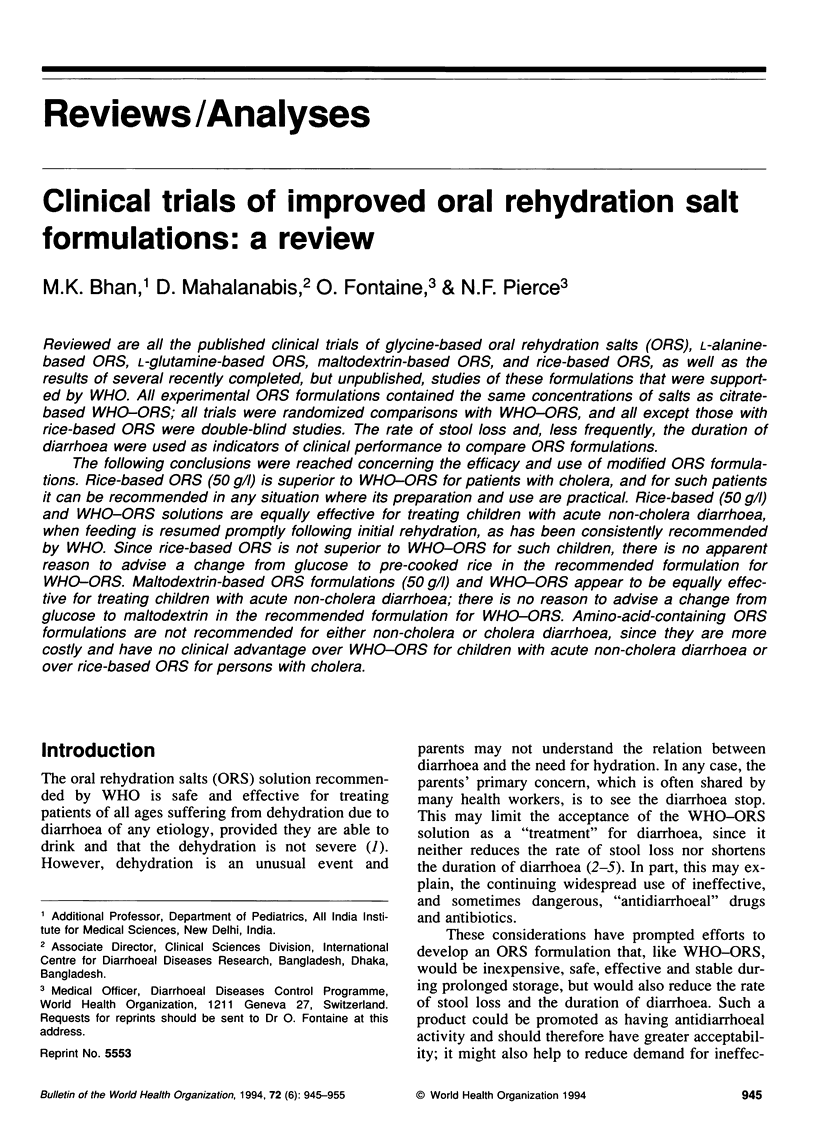
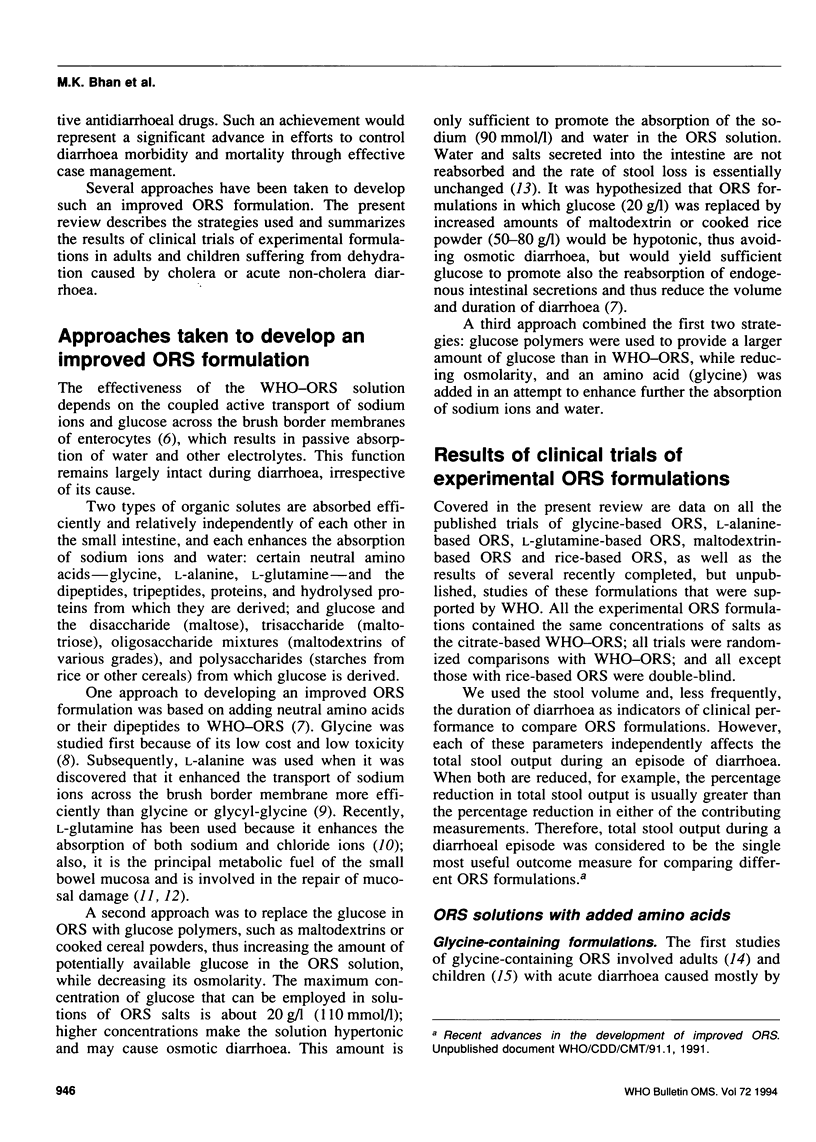
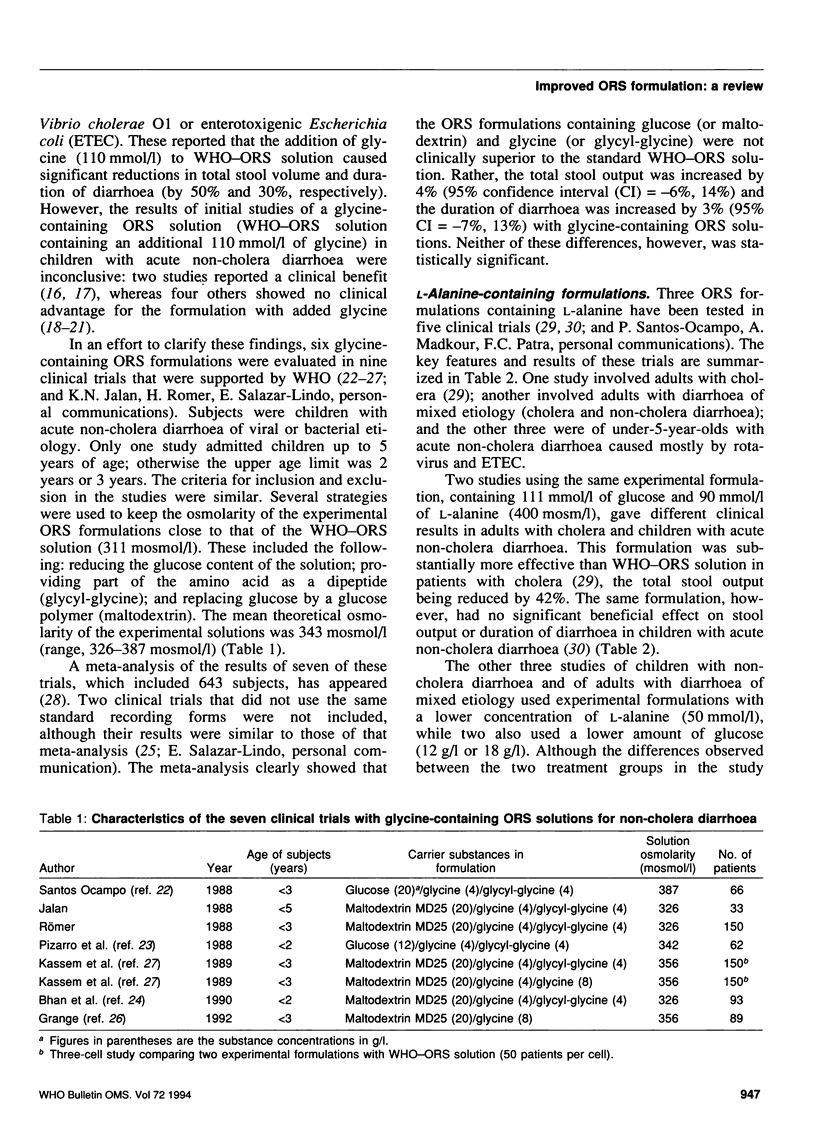
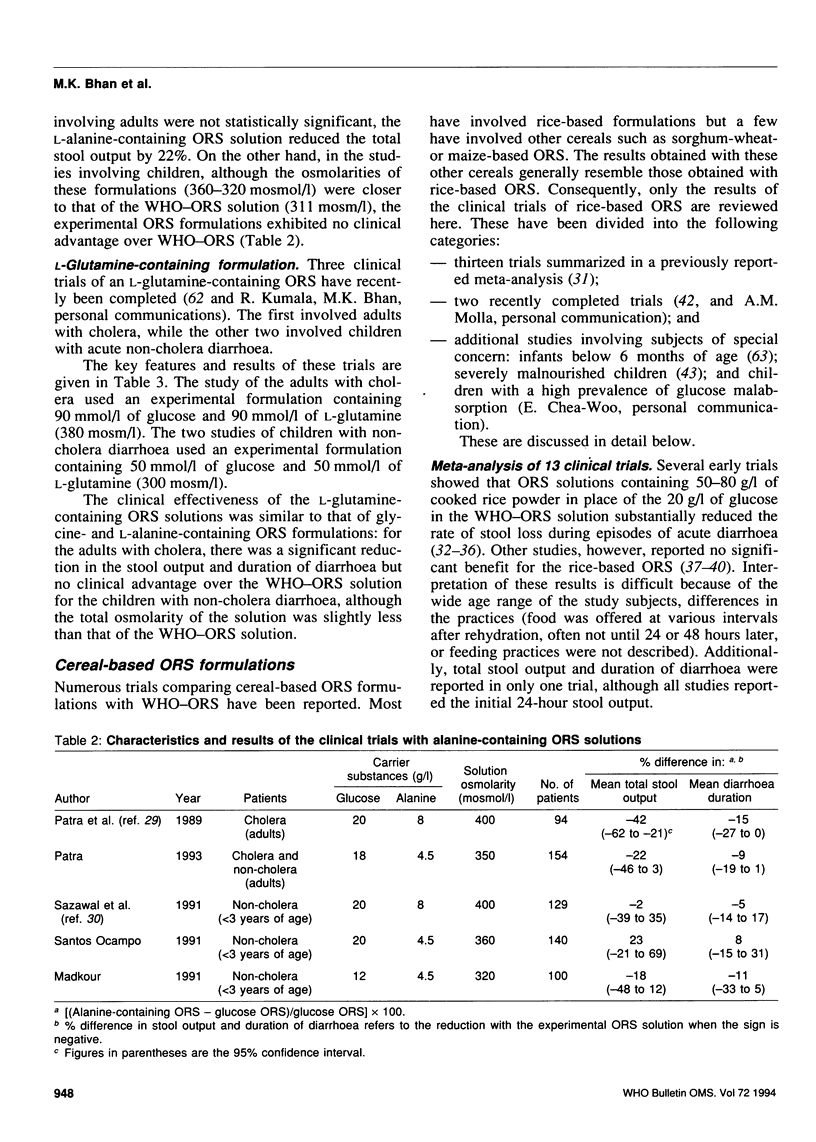
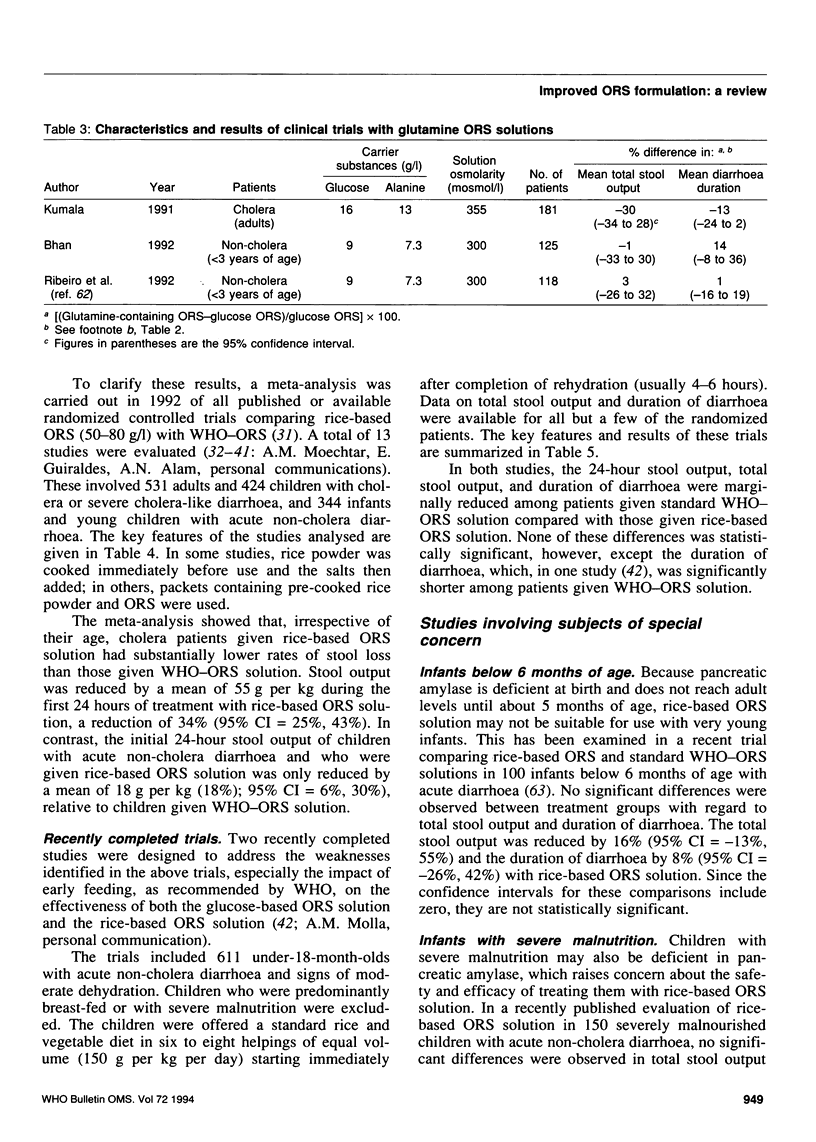
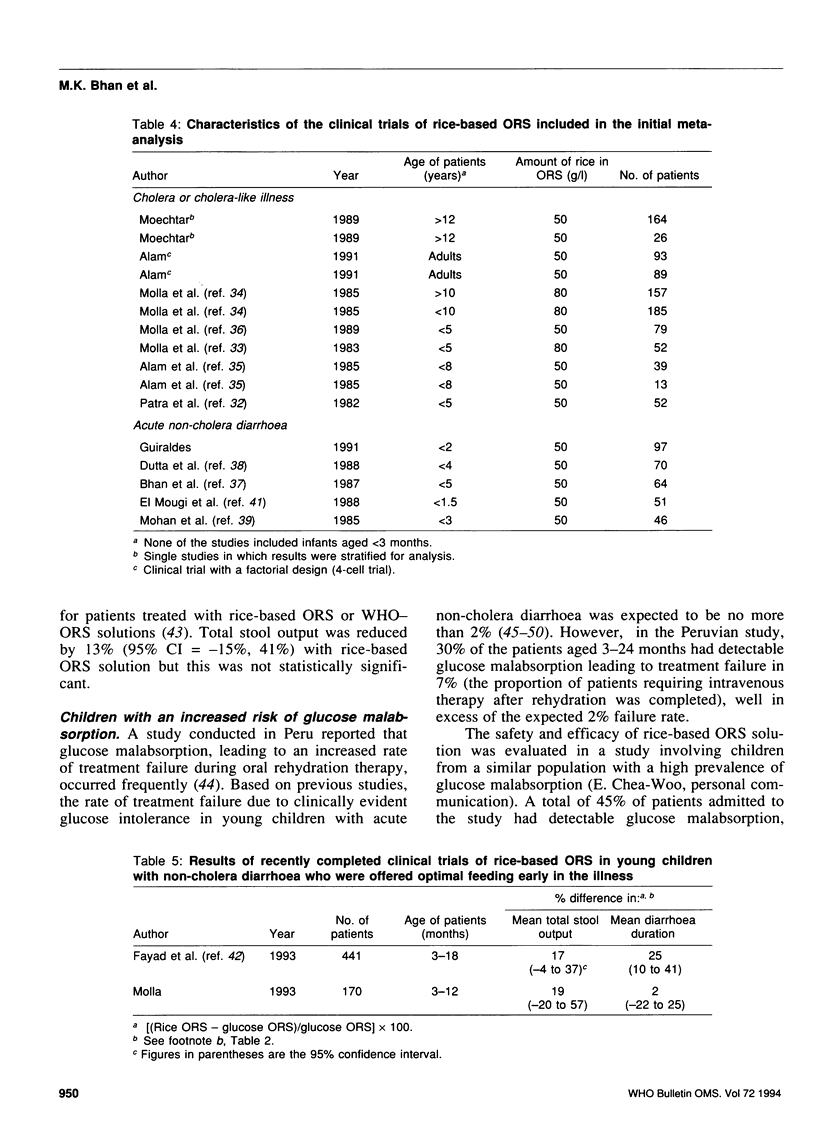
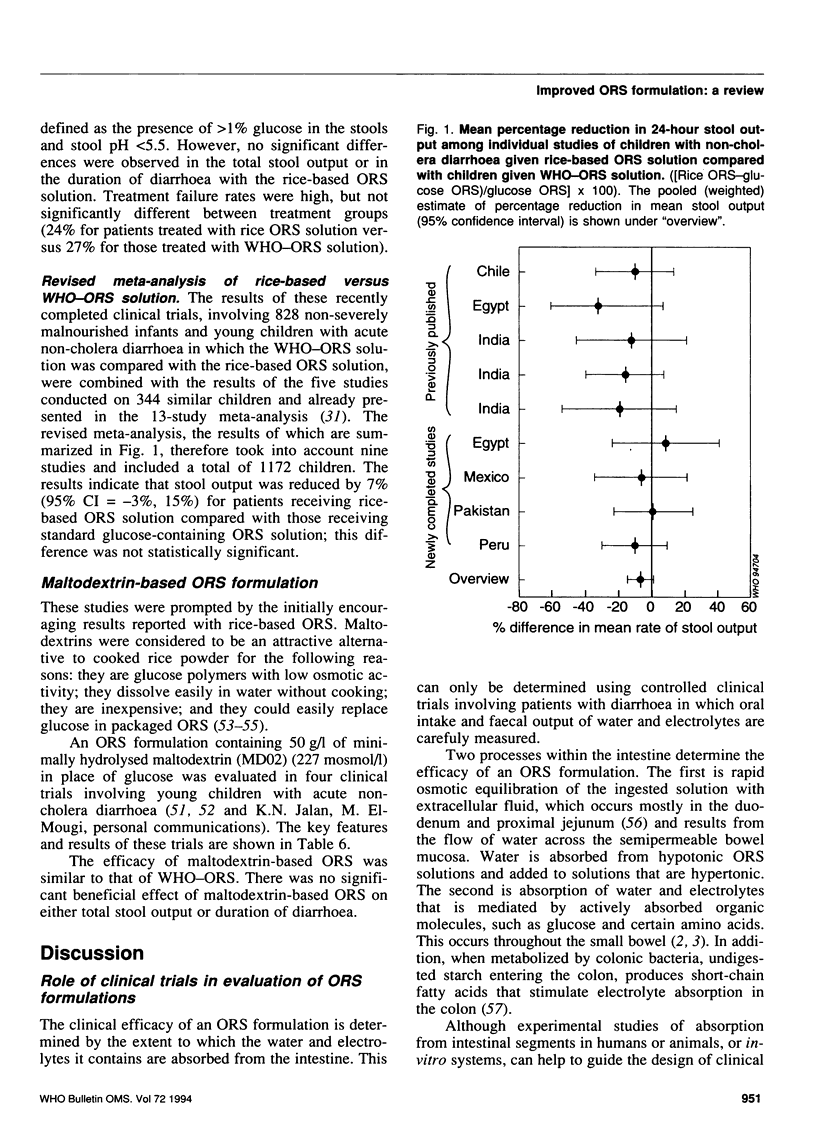
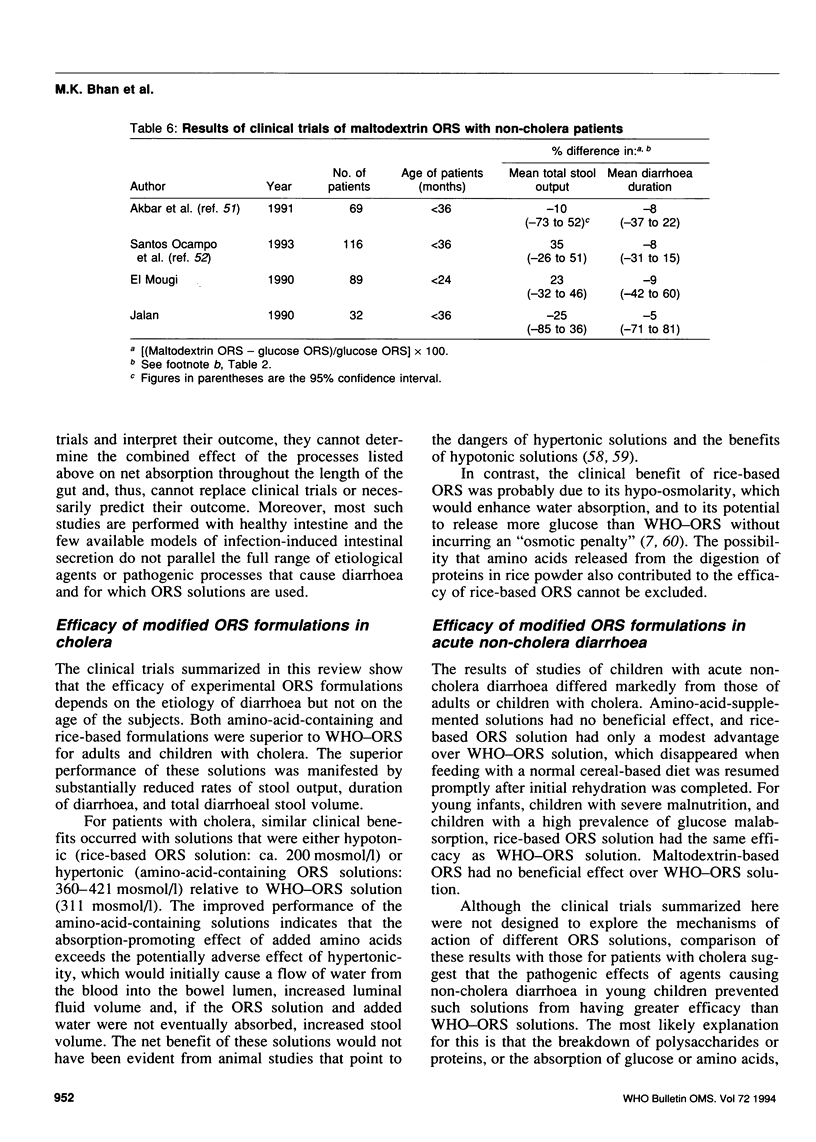

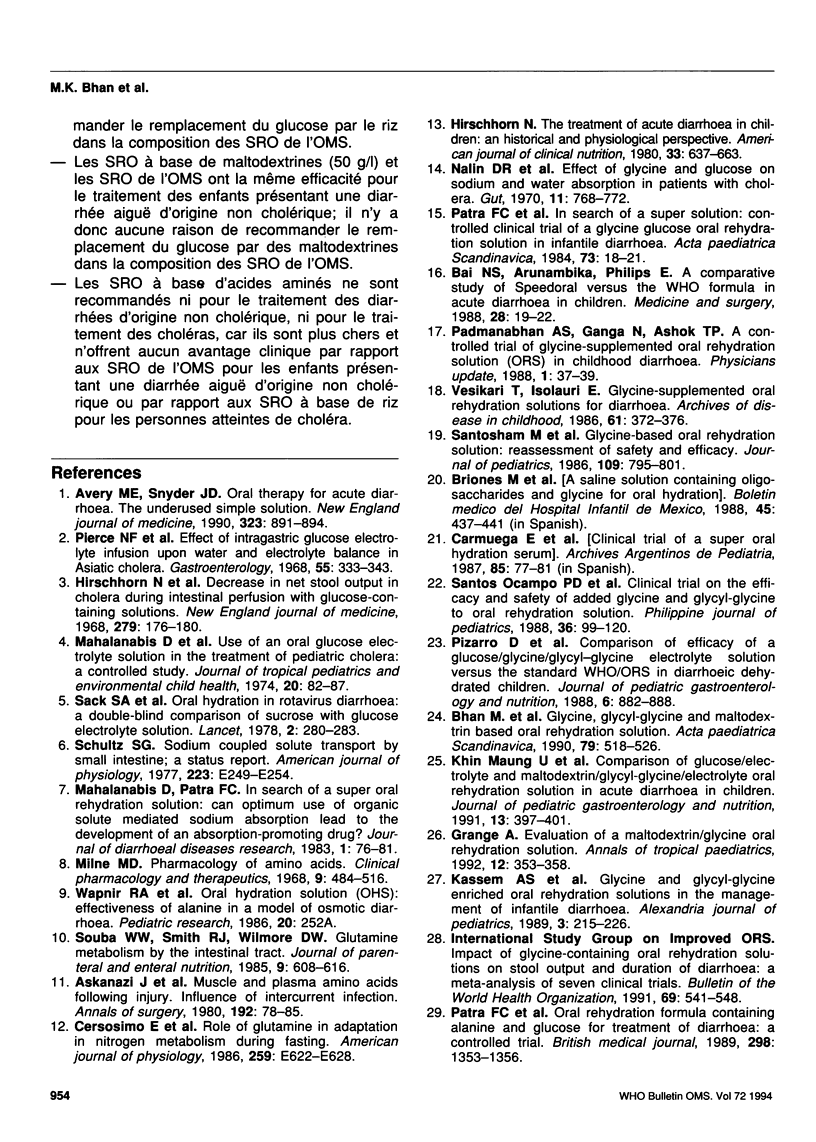
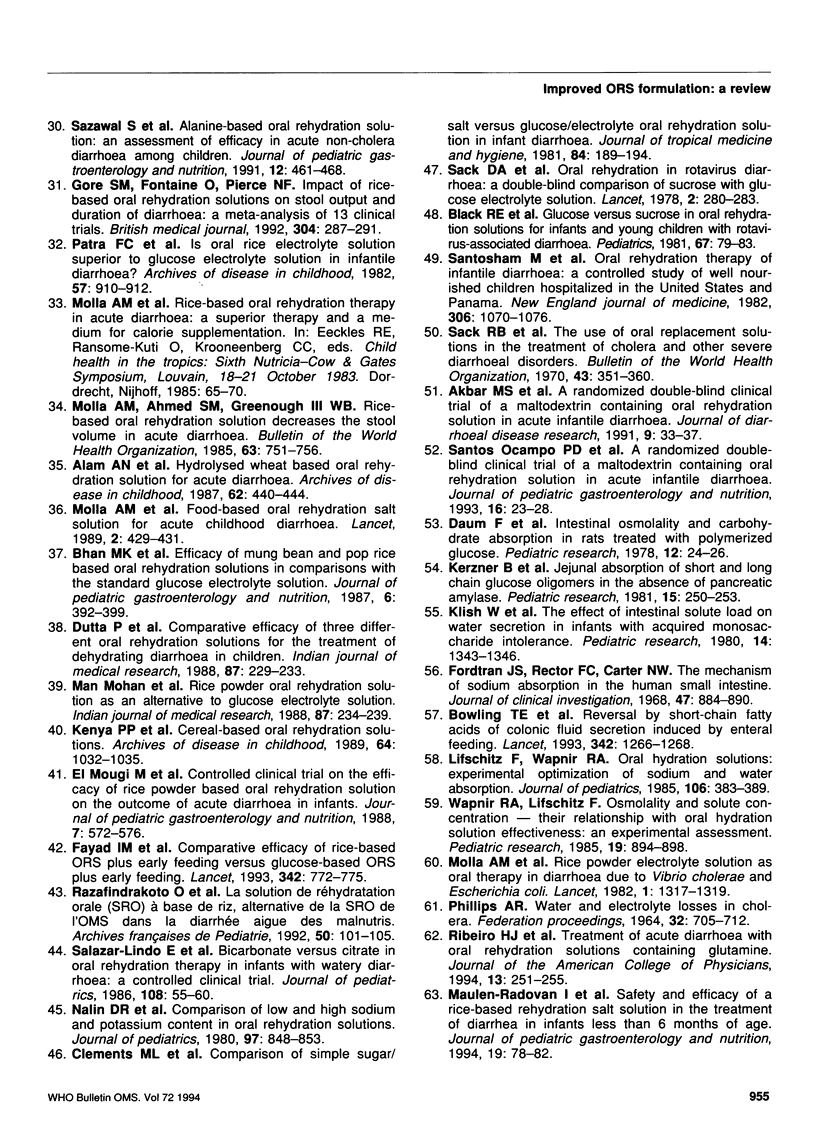
Selected References
These references are in PubMed. This may not be the complete list of references from this article.
- Akbar M. S., Baker K. M., Aziz M. A., Khan W. A., Salim A. F. A randomised, double-blind clinical trial of a maltodextrin containing oral rehydration solution in acute infantile diarrhoea. J Diarrhoeal Dis Res. 1991 Mar;9(1):33–37. [PubMed] [Google Scholar]
- Alam A. N., Sarker S. A., Molla A. M., Rahaman M. M., Greenough W. B., 3rd Hydrolysed wheat based oral rehydration solution for acute diarrhoea. Arch Dis Child. 1987 May;62(5):440–444. doi: 10.1136/adc.62.5.440. [DOI] [PMC free article] [PubMed] [Google Scholar]
- Askanazi J., Carpentier Y. A., Michelsen C. B., Elwyn D. H., Furst P., Kantrowitz L. R., Gump F. E., Kinney J. M. Muscle and plasma amino acids following injury. Influence of intercurrent infection. Ann Surg. 1980 Jul;192(1):78–85. doi: 10.1097/00000658-198007000-00014. [DOI] [PMC free article] [PubMed] [Google Scholar]
- Avery M. E., Snyder J. D. Oral therapy for acute diarrhea. The underused simple solution. N Engl J Med. 1990 Sep 27;323(13):891–894. doi: 10.1056/NEJM199009273231307. [DOI] [PubMed] [Google Scholar]
- Bhan M. K., Ghai O. P., Khoshoo V., Vasudev A. S., Bhatnagar S., Arora N. K., Rashmi, Stintzing G. Efficacy of mung bean (lentil) and pop rice based rehydration solutions in comparison with the standard glucose electrolyte solution. J Pediatr Gastroenterol Nutr. 1987 May-Jun;6(3):392–399. doi: 10.1097/00005176-198705000-00016. [DOI] [PubMed] [Google Scholar]
- Bhan M. K., Sazawal S., Bhatnagar S., Bhandari N., Guha D. K., Aggarwal S. K. Glycine, glycyl-glycine and maltodextrin based oral rehydration solution. Assessment of efficacy and safety in comparison to standard ORS. Acta Paediatr Scand. 1990 May;79(5):518–526. doi: 10.1111/j.1651-2227.1990.tb11506.x. [DOI] [PubMed] [Google Scholar]
- Black R. E., Merson M. H., Taylor P. R., Yolken R. H., Sack D. A. Glucose vs sucrose in oral rehydration solutions for infants and young children with rotavirus-associated diarrhea. Pediatrics. 1981 Jan;67(1):79–83. [PubMed] [Google Scholar]
- Bowling T. E., Raimundo A. H., Grimble G. K., Silk D. B. Reversal by short-chain fatty acids of colonic fluid secretion induced by enteral feeding. Lancet. 1993 Nov 20;342(8882):1266–1268. doi: 10.1016/0140-6736(93)92360-6. [DOI] [PubMed] [Google Scholar]
- Briones M., Luis de Luna J., Covarrubias J., Vega-Franco L. Empleo de una solución salina, con oligosacáridos y glicina, para la hidratación por vía oral. Bol Med Hosp Infant Mex. 1988 Jul;45(7):437–441. [PubMed] [Google Scholar]
- Cersosimo E., Williams P. E., Radosevich P. M., Hoxworth B. T., Lacy W. W., Abumrad N. N. Role of glutamine in adaptations in nitrogen metabolism during fasting. Am J Physiol. 1986 Jun;250(6 Pt 1):E622–E628. doi: 10.1152/ajpendo.1986.250.6.E622. [DOI] [PubMed] [Google Scholar]
- Clements M. L., Levine M. M., Cleaves F., Hughes T. P., Caceres M., Aleman E., Black R. E., Rust J. Comparison of simple sugar/salt versus glucose/electrolyte oral rehydration solutions in infant diarrhoea. J Trop Med Hyg. 1981 Oct;84(5):189–194. [PubMed] [Google Scholar]
- Daum F., Cohen M. I., McNamara H., Finberg L. Intestinal osmolality and carbohydrate absorption in rats treated with polymerized glucose. Pediatr Res. 1978 Jan;12(1):24–26. doi: 10.1203/00006450-197801000-00006. [DOI] [PubMed] [Google Scholar]
- Dutta P., Dutta D., Bhattacharya S. K., Bhattacharya M. K., Sinha A. K., Mondal B. C., Pal S. C. Comparative efficacy of three different oral rehydration solutions for the treatment of dehydrating diarrhoea in children. Indian J Med Res. 1988 Mar;87:229–233. [PubMed] [Google Scholar]
- Fordtran J. S., Rector F. C., Jr, Carter N. W. The mechanisms of sodium absorption in the human small intestine. J Clin Invest. 1968 Apr;47(4):884–900. doi: 10.1172/JCI105781. [DOI] [PMC free article] [PubMed] [Google Scholar]
- Gore S. M., Fontaine O., Pierce N. F. Impact of rice based oral rehydration solution on stool output and duration of diarrhoea: meta-analysis of 13 clinical trials. BMJ. 1992 Feb 1;304(6822):287–291. doi: 10.1136/bmj.304.6822.287. [DOI] [PMC free article] [PubMed] [Google Scholar]
- Grange A. Evaluation of malto-dextrin/glycine oral rehydration solution. Ann Trop Paediatr. 1992;12(4):353–358. doi: 10.1080/02724936.1992.11747599. [DOI] [PubMed] [Google Scholar]
- Hirschhorn N., Kinzie J. L., Sachar D. B., Northrup R. S., Taylor J. O., Ahmad S. Z., Phillips R. A. Decrease in net stool output in cholera during intestinal perfusion with glucose-containing solutions. N Engl J Med. 1968 Jul 25;279(4):176–181. doi: 10.1056/NEJM196807252790402. [DOI] [PubMed] [Google Scholar]
- Hirschhorn N. The treatment of acute diarrhea in children. An historical and physiological perspective. Am J Clin Nutr. 1980 Mar;33(3):637–663. doi: 10.1093/ajcn/33.3.637. [DOI] [PubMed] [Google Scholar]
- Kenya P. R., Odongo H. W., Oundo G., Waswa K., Muttunga J., Molla A. M., Nath S. K., Molla A., Greenough W. B., 3rd, Juma R. Cereal based oral rehydration solutions. Arch Dis Child. 1989 Jul;64(7):1032–1035. doi: 10.1136/adc.64.7.1032. [DOI] [PMC free article] [PubMed] [Google Scholar]
- Kerzner B., Sloan H. R., Haase G., McClung H. J., Ailabouni A. H. The jejunal absorption of glucose oligomers in the absence of pancreatic enzymes. Pediatr Res. 1981 Mar;15(3):250–253. doi: 10.1203/00006450-198103000-00010. [DOI] [PubMed] [Google Scholar]
- Khin-Maung-U, Myo-Khin, Nyunt-Nyunt-Wai, Mu-Mu-Khin, Mya-Thi, Thein-Thein-Myint Comparison of glucose/electrolyte and maltodextrin/glycine/glycyl-glycine/electrolyte oral rehydration solutions in acute diarrhea in children. J Pediatr Gastroenterol Nutr. 1991 Nov;13(4):397–401. doi: 10.1097/00005176-199111000-00010. [DOI] [PubMed] [Google Scholar]
- Klish W. J., Udall J. N., Calvin R. T., Nichols B. L. The effect of intestinal solute load on water secretion in infants with acquired monosaccharide intolerance. Pediatr Res. 1980 Dec;14(12):1343–1346. doi: 10.1203/00006450-198012000-00014. [DOI] [PubMed] [Google Scholar]
- Lifshitz F., Wapnir R. A. Oral hydration solutions: experimental optimization of water and sodium absorption. J Pediatr. 1985 Mar;106(3):383–389. doi: 10.1016/s0022-3476(85)80661-2. [DOI] [PubMed] [Google Scholar]
- Mahalanabis D., Patra F. C. In search of a super oral rehydration solution: can optimum use of organic solute-mediated sodium absorption lead to the development of an absorption promoting drug? J Diarrhoeal Dis Res. 1983 Jun;1(2):76–81. [PubMed] [Google Scholar]
- Mahalanabis D., Sack R. B., Jacobs B., Mondal A., Thomas J. Use of an oral glucose-electrolyte solution in the treatment of paediatric cholera--a controlled study. J Trop Pediatr Environ Child Health. 1974 Apr;20(2):82–87. doi: 10.1093/tropej/20.2.82. [DOI] [PubMed] [Google Scholar]
- Maulen-Radovan I., Fernandez-Varela H., Acosta-Bastidas M., Frenk S. Safety and efficacy of a rice-based oral rehydration salt solution in the treatment of diarrhea in infants less than 6 months of age. J Pediatr Gastroenterol Nutr. 1994 Jul;19(1):78–82. doi: 10.1097/00005176-199407000-00012. [DOI] [PubMed] [Google Scholar]
- Milne M. D. Pharmacology of amino acids. Clin Pharmacol Ther. 1968 Jul-Aug;9(4):484–516. doi: 10.1002/cpt196894484. [DOI] [PubMed] [Google Scholar]
- Mohan M., Antony T. J., Malik S., Mathur M. Rice powder oral rehydration solution as an alternative to glucose electrolyte solution. Indian J Med Res. 1988 Mar;87:234–239. [PubMed] [Google Scholar]
- Molla A. M., Ahmed S. M., Greenough W. B., 3rd Rice-based oral rehydration solution decreases the stool volume in acute diarrhoea. Bull World Health Organ. 1985;63(4):751–756. [PMC free article] [PubMed] [Google Scholar]
- Molla A. M., Molla A., Nath S. K., Khatun M. Food-based oral rehydration salt solution for acute childhood diarrhoea. Lancet. 1989 Aug 19;2(8660):429–431. doi: 10.1016/s0140-6736(89)90601-6. [DOI] [PubMed] [Google Scholar]
- Molla A. M., Sarker S. A., Hossain M., Molla A., Greenough W. B., 3rd Rice-powder electrolyte solution as oral-therapy in diarrhoea due to Vibrio cholerae and Escherichia coli. Lancet. 1982 Jun 12;1(8285):1317–1319. doi: 10.1016/s0140-6736(82)92396-0. [DOI] [PubMed] [Google Scholar]
- Nalin D. R., Cash R. A., Rahman M., Yunus M. Effect of glycine and glucose on sodium and water adsorption in patients with cholera. Gut. 1970 Sep;11(9):768–772. doi: 10.1136/gut.11.9.768. [DOI] [PMC free article] [PubMed] [Google Scholar]
- Nalin D. R., Harland E., Ramlal A., Swaby D., McDonald J., Gangarosa R., Levine M., Akierman A., Antoine M., Mackenzie K. Comparison of low and high sodium and potassium content in oral rehydration solutions. J Pediatr. 1980 Nov;97(5):848–853. doi: 10.1016/s0022-3476(80)80287-3. [DOI] [PubMed] [Google Scholar]
- PHILLIPS R. A. WATER AND ELECTROLYTE LOSSES IN CHOLERA. Fed Proc. 1964 May-Jun;23:705–712. [PubMed] [Google Scholar]
- Patra F. C., Mahalanabis D., Jalan K. N., Sen A., Banerjee P. In search of a super solution: controlled trial of glycine-glucose oral rehydration solution in infantile diarrhoea. Acta Paediatr Scand. 1984 Jan;73(1):18–21. doi: 10.1111/j.1651-2227.1984.tb09891.x. [DOI] [PubMed] [Google Scholar]
- Patra F. C., Mahalanabis D., Jalan K. N., Sen A., Banerjee P. Is oral rice electrolyte solution superior to glucose electrolyte solution in infantile diarrhoea? Arch Dis Child. 1982 Dec;57(12):910–912. doi: 10.1136/adc.57.12.910. [DOI] [PMC free article] [PubMed] [Google Scholar]
- Patra F. C., Sack D. A., Islam A., Alam A. N., Mazumder R. N. Oral rehydration formula containing alanine and glucose for treatment of diarrhoea: a controlled trial. BMJ. 1989 May 20;298(6684):1353–1356. doi: 10.1136/bmj.298.6684.1353. [DOI] [PMC free article] [PubMed] [Google Scholar]
- Pierce N. F., Banwell J. G., Rupak D. M., Mitra R. C., Caranasos G. J., Keimowitz R. I., Mondal A., Manji P. M. Effect of intragastric glucose-electrolyte infusion upon water and electrolyte balance in Asiatic cholera. Gastroenterology. 1968 Sep;55(3):333–343. [PubMed] [Google Scholar]
- Razafindrakoto O., Ravelomanana N., Randriamiharisoa F., Rasoarivao V., Ramialimanana V., Rakotoarimanana D. R., Razanamparany M. La solution de réhydratation orale (SRO) à base de riz, alternative de la SRO de l'OMS dans la diarrhée aiguë des malnutris. Arch Fr Pediatr. 1993 Feb;50(2):101–105. [PubMed] [Google Scholar]
- Ribeiro Júnior H., Ribeiro T., Mattos A., Palmeira C., Fernandez D., Sant'Ana I., Rodrigues I., Bendicho M. T., Fontaine O. Treatment of acute diarrhea with oral rehydration solutions containing glutamine. J Am Coll Nutr. 1994 Jun;13(3):251–255. doi: 10.1080/07315724.1994.10718405. [DOI] [PubMed] [Google Scholar]
- Sack D. A., Chowdhury A. M., Eusof A., Ali M. A., Merson M. H., Islam S., Black R. E., Brown K. H. Oral hydration rotavirus diarrhoea: a double blind comparison of sucrose with glucose electrolyte solution. Lancet. 1978 Aug 5;2(8084):280–283. doi: 10.1016/s0140-6736(78)91687-2. [DOI] [PubMed] [Google Scholar]
- Sack D. A., Chowdhury A. M., Eusof A., Ali M. A., Merson M. H., Islam S., Black R. E., Brown K. H. Oral hydration rotavirus diarrhoea: a double blind comparison of sucrose with glucose electrolyte solution. Lancet. 1978 Aug 5;2(8084):280–283. doi: 10.1016/s0140-6736(78)91687-2. [DOI] [PubMed] [Google Scholar]
- Sack R. B., Cassells J., Mitra R., Merritt C., Butler T., Thomas J., Jacobs B., Chaudhuri A., Mondal A. The use of oral replacement solutions in the treatment of choleraand other severe diarrhoeal disorders. Bull World Health Organ. 1970;43(3):351–360. [PMC free article] [PubMed] [Google Scholar]
- Salazar-Lindo E., Sack R. B., Chea-Woo E., Leon-Barua R., Kay B. A., Yi A., Robertson A. D. Bicarbonate versus citrate in oral rehydration therapy in infants with watery diarrhea: a controlled clinical trial. J Pediatr. 1986 Jan;108(1):55–60. doi: 10.1016/s0022-3476(86)80768-5. [DOI] [PubMed] [Google Scholar]
- Santos Ocampo P. D., Bravo L. C., Rogacion J. M., Battad G. R. A randomized double-blind clinical trial of a maltodextrin-containing oral rehydration solution in acute infantile diarrhea. J Pediatr Gastroenterol Nutr. 1993 Jan;16(1):23–28. doi: 10.1097/00005176-199301000-00005. [DOI] [PubMed] [Google Scholar]
- Santosham M., Burns B. A., Reid R., Letson G. W., Duncan B., Powlesland J. A., Foster S., Garrett S., Croll L., Nyunt Nyunt W. Glycine-based oral rehydration solution: reassessment of safety and efficacy. J Pediatr. 1986 Nov;109(5):795–801. doi: 10.1016/s0022-3476(86)80696-5. [DOI] [PubMed] [Google Scholar]
- Santosham M., Daum R. S., Dillman L., Rodriguez J. L., Luque S., Russell R., Kourany M., Ryder R. W., Bartlett A. V., Rosenberg A. Oral rehydration therapy of infantile diarrhea: a controlled study of well-nourished children hospitalized in the United States and Panama. N Engl J Med. 1982 May 6;306(18):1070–1076. doi: 10.1056/NEJM198205063061802. [DOI] [PubMed] [Google Scholar]
- Sazawal S., Bhatnagar S., Bhan M. K., Saxena S. K., Arora N. K., Aggarwal S. K., Kashyap D. K. Alanine-based oral rehydration solution: assessment of efficacy in acute noncholera diarrhea among children. J Pediatr Gastroenterol Nutr. 1991 May;12(4):461–468. [PubMed] [Google Scholar]
- Schultz S. G. Sodium-coupled solute transport of small intestine: a status report. Am J Physiol. 1977 Oct;233(4):E249–E254. doi: 10.1152/ajpendo.1977.233.4.E249. [DOI] [PubMed] [Google Scholar]
- Souba W. W., Smith R. J., Wilmore D. W. Glutamine metabolism by the intestinal tract. JPEN J Parenter Enteral Nutr. 1985 Sep-Oct;9(5):608–617. doi: 10.1177/0148607185009005608. [DOI] [PubMed] [Google Scholar]
- Vesikari T., Isolauri E. Glycine supplemented oral rehydration solutions for diarrhoea. Arch Dis Child. 1986 Apr;61(4):372–376. doi: 10.1136/adc.61.4.372. [DOI] [PMC free article] [PubMed] [Google Scholar]
- Wapnir R. A., Lifshitz F. Osmolality and solute concentration--their relationship with oral hydration solution effectiveness: an experimental assessment. Pediatr Res. 1985 Sep;19(9):894–898. doi: 10.1203/00006450-198509000-00004. [DOI] [PubMed] [Google Scholar]
- el-Mougi M., Hegazi E., Galal O., el Akkad N., el-Abhar A., Nour N., el-Hadi Emam M., Ahmadi A. R. Controlled clinical trial on the efficacy of rice powder-based oral rehydration solution on the outcome of acute diarrhea in infants. J Pediatr Gastroenterol Nutr. 1988 Jul-Aug;7(4):572–576. doi: 10.1097/00005176-198807000-00016. [DOI] [PubMed] [Google Scholar]


